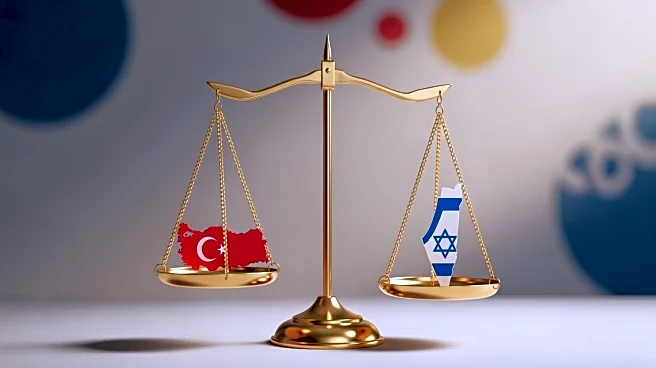What's Happening?
Turkey's growing role in postwar Gaza has become a point of contention for Israel. Despite Israel's efforts to exclude Turkey from negotiations with Hamas, U.S. President Donald Trump has facilitated Turkey's involvement
in the ceasefire agreement. Turkish President Recep Tayyip Erdogan signed the accord at the Peace Summit in Sharm el-Sheikh, alongside Trump and other regional leaders. Turkey's participation is seen as crucial due to its leverage over Hamas, which has helped secure the ceasefire. However, Erdogan's rhetoric remains hostile towards Israel, raising concerns about Turkey's influence in Gaza's future governance.
Why It's Important?
Turkey's involvement in Gaza is significant as it alters the dynamics of Middle Eastern diplomacy. While Turkey's peacekeeping experience is acknowledged, its role in Gaza is strategically concerning for Israel. Turkey's support for Hamas and its growing regional assertiveness could complicate efforts to disarm Hamas and establish a new governing structure. The situation highlights the complex interplay of regional powers and the challenges in achieving long-term stability in Gaza. Israel's interests may be at odds with Turkey's ambitions, potentially affecting regional alliances and security.
What's Next?
The future of Gaza's governance remains uncertain, with unresolved questions about the international force's composition and Hamas's role. Turkey's statements suggest a desire for deeper involvement, possibly including troop deployment. The next phase of the agreement, focusing on long-term arrangements, will be challenging with Turkey's participation. Israel and other regional players may need to navigate Turkey's influence carefully to ensure their interests are protected. The evolving situation requires diplomatic efforts to balance regional power dynamics and achieve sustainable peace.
Beyond the Headlines
Turkey's involvement in Gaza reflects broader geopolitical shifts, including its growing assertiveness and the weakening of Iran's influence. The situation underscores the importance of regional diplomacy and the potential for changing alliances. Turkey's role could impact the balance of power in the Middle East, with implications for Israel's security and regional stability. The ethical and strategic dimensions of Turkey's involvement highlight the complexities of international relations in conflict resolution.











